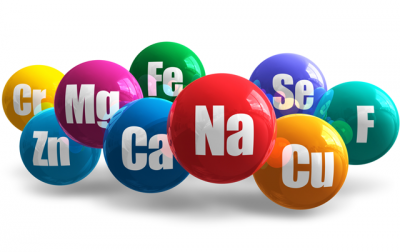Our body utilizes minerals for several vital things such as keeping the blood cells and bones healthy. In fact, minerals work with vitamins as vital elements in the coenzymes and enzymes.
 If your body lacks any essential minerals, it will fail to work at its best. For instance, zinc is vital for an enzyme, which further triggers Vitamin A that in turn promotes healthy eyesight and its deficiency might lead to night blindness.
If your body lacks any essential minerals, it will fail to work at its best. For instance, zinc is vital for an enzyme, which further triggers Vitamin A that in turn promotes healthy eyesight and its deficiency might lead to night blindness.
Now, let skim through those vital minerals:
• Calcium
Calcium undoubtedly is the most vital mineral and plays a great role in the activities of several enzymes in our body. It is necessary for maintaining as well as building healthy teeth and bones. Calcium releases the required neurotransmitters, regulates blood clotting and heartbeat as well as the muscles contraction. Lactation, pregnancy and fetus development all require calcium. Further, deficiency in kids might cause rickets, whereas in adults, it might cause osteoporosis and elevated blood pressure problems.
• Phosphorus
Phosphorus is the most vital mineral, which plays a vital role in metabolism of energy, repair and maintenance of tissues and cells, conversion of protein for overall body development and absorption of calcium. Phosphorus is available in most of the food items including protein rich foods.
• Magnesium
It works for activating several vital enzymes, nervous functions and muscles. Signs of magnesium deficiency in body include stress, insomnia, appetite loss, headaches and muscle cramps.
• Chromium
Chromium plays a pivotal role in GTF or glucose tolerance factor, which is a crucial enzyme system, which works in tandem with insulin for absorbing glucose into the cells and in regulation of blood sugar levels. Excess consumption of white flour food items and foods containing refined sugar might deplete the chromium in your body.
• Iron
Iron is a crucial mineral to humans. It plays a crucial role in hemoglobin molecule of RBCs or red blood cells where it transports oxygen from a person’s lungs to his/her body tissues and takes carbon dioxide or CO2 from tissues to lungs. Furthermore, iron regulates several vital enzymes in the production of energy and metabolism including the DNA synthesis. In fact, iron deficiency is known to be the most usual mineral deficiency all over the globe, which leads to anemia.
• Zinc
Zinc is a vital component of more than 200 vital enzymes in our body. The body needs zinc in adequate levels for proper functioning of the immune system and its deficiency might make the person prone to infections. It is vital for maintenance of smell, taste and vision.
• Potassium
Potassium assists in proper functioning of nerves and muscles, lowers the risk of heart and blood pressure problems, eases fatigue, confusion and irritability. Older individuals are more prone to suffer from the symptoms of excess potassium in their kidneys.
• Sodium
Sodium is available in a range of food items that we intake. However, most individuals tend to consume more amount of salt than what is required actually. The intake of salt for adults should be not more than 6 grams i.e. 2.5 grams of sodium daily. In fact, three quarters of the salt intake comes from foods such as ready meals, sauces, soups and breakfast cereals.
The requirements for these minerals differ for specific groups of the populace, such as for pregnant women and older folks. Thus, it is advisable to discuss the same with your physician.


 Cart : 0 items - $0.00
Cart : 0 items - $0.00










